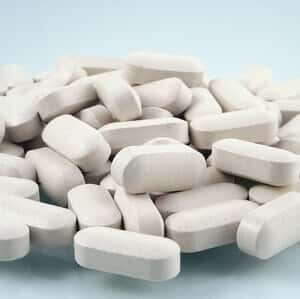
We’ve been worried about this for years and now it appears to have come to pass.
Based on very sketchy data, manufacturers of calcium pills have touted their benefits for strong bones. And many physicians have recommended that women take extra calcium daily to prevent osteoporosis. Unfortunately, more recent data does not demonstrate that calcium supplements actually reduce fractures (BMJ, Sep. 29, 2015).
Getting Too Much Calcium?
Walter Willett, M.D., M.P.H., Dr.P.H., Chair, Department of Nutrition at the Harvard School of Public Health, has been telling us for years that Americans have been overdosing on calcium. The evidence that calcium actually builds bone and prevents osteoporosis is relatively modest. Although he has been cautious, we have detected an undercurrent of concern from Dr. Willett and that fed our own fears that millions of people could have been sold a bill of goods when it came to calcium.
The research published in the British medical journal BMJ (July 29. 2010) reveals a 30 percent increased risk of heart attack in people over the age of 40 who were popping down extra calcium. This study involved nearly 12,000 people and was a meta-analysis of 11 randomized controlled trials (the gold standard in research).
You will hear that the this 30 percent increased risk is actually quite small. That is true in absolute terms, but if this had been a 30 percent reduced risk of heart attack (as seen with some statins and heart attacks), it would be hyped on TV commercials as a fantastic benefit. Even such a small risk can mean millions of heart attacks, given the huge numbers of people taking calcium supplements on a regular basis.
More Reason for Caution:
Bottom line, we’re very concerned about this analysis. And other research has confirmed that there are grounds for anxiety. Studies tracking both men and women have found independently that calcium supplements are associated with cardiovascular disease and premature death (JAMA Internal Medicine, Apr. 22, 2013; BMJ, Feb. 13, 2013).
How Much Is Too Much?
These people were taking the frequently-recommended dose of 1500 mg of calcium daily as a supplement. An editorial in the journal Heart (June, 2012) concluded:
“Thus, the consistent evidence is that calcium supplements do more harm than good and that other interventions are preferable for reducing the risk of osteoporotic fractures…We should return to seeing calcium as an important component of a balanced diet and not as a low-cost panacea to the universal problem of postmenopausal bone loss.”
With so many millions popping down huge doses of calcium, we fear that there could excess deaths caused by this supplement. If something doesn’t really help that much and might cause harm, we suggest caution. Until further clarification, we suggest getting your calcium from food rather than a pill.
Getting Calcium by Eating Food:
The classic dietary source of calcium are dairy foods. Milk, yogurt (especially Greek style yogurt), kefir, buttermilk and cheese are excellent sources of calcium. But the lactose-intolerant need not despair. There are other dietary sources.
These include the green leafy vegetables that are good for us in so many ways:
- bok choy
- broccoli
- collards
- kale
- mustard greens
- turnip greens
Canned fish that have the bones included:
- anchovies
- salmon
- sardines
Nuts, beans and seeds are also useful for their calcium content:
- almonds
- Brazil nuts
- lentils
- sesame seeds
- soybeans
- sunflower seeds
- tahini
- tofu
In addition, blackstrap molasses is rich in calcium, though it might be hard or inadvisable to consume very much because of the sugar content.
If you want to know more about the calcium controversy and other ways to prevent weakened bones and osteoporosis, our one-hour radio show (# 752) with Walter Willett, MD, DrPH, Amy Joy Lanou, PhD and Michael Castleman called Bone Vitality would be well worth your time. It is available on CD at this link.

